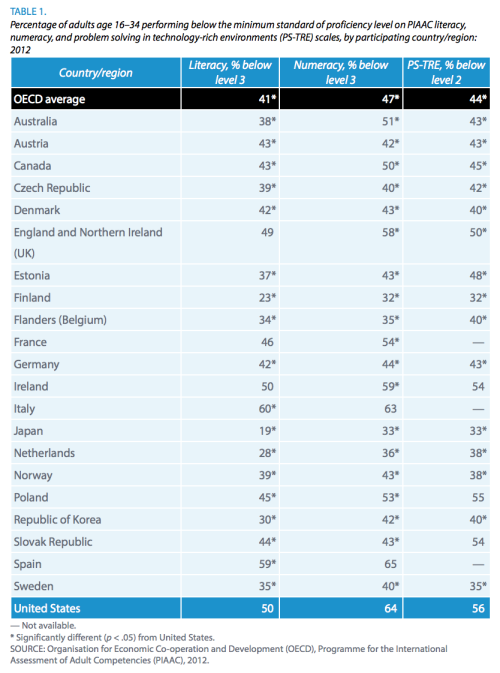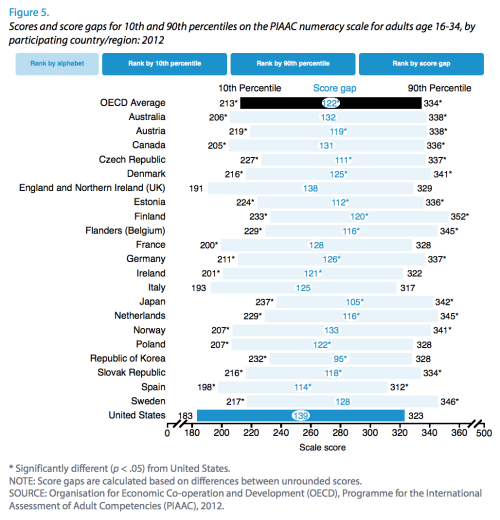It’s the definition of a counter-intuitive statement: The Millennial generation has attained the highest levels of education of any previous American generation, yet on average demonstrates weak skills in literacy, numeracy, and problem solving in technology-rich environments compared to their international peers.
This is a tough realization to stomach for a number of reasons.
Not only is it disheartening to hear, and confusing considering the exorbitant and rising costs of education in the U.S., but Millennials are estimated to make up 50 percent of the employee population by 2020 and will shape the economic, political and social landscape for years to come (so their skills are important, to say the least).
Troubling test findings
What though, will the impact of the predicted skills shortage look like? A new report by the Educational Testing Service (ETS), titled America’s Skills Challenge: Millennials and the Future, begins to answer that question, bringing to attention a topic that is of growing interest to a broad range of constituencies.
The ETS report uses data from the Programme for the International Assessment of Adult Competencies (PIAAC) to explore this topic. ETS asks why we should we pay attention to these findings, when some argue that comparative international assessments do not yield valid results.
The PIAAC though, is not the only study to raise these concerns. The National Assessment of Educational Progress (NAEP) as well as organizations such as The College Board and ACT, all report similar findings. In 2013, the NAEP found that 74 percent of U.S. 12th graders were below proficient in mathematics and 62 percent were below proficient in reading, and the College Board reported that 57 percent of SAT takers failed to qualify as “college ready.”
Additionally, ACT recently reported that close to 31 percent (one out of three) high school graduates taking the ACT exam failed to meet any of the four college readiness benchmarks in English, math, reading, and science.
These findings – besides the fact that any question of inadequate education or skills for our nation’s youth and future generations should always top of mind – tells us that yes, we should pay attention to such findings.
U.S. Millennials don’t fare well
The PIACC is unlike school-based surveys (which focus on specific ages or grades of in-school students) and was designed as a household study of nationally representative samples of adults age 16-65. The ETS report disaggregates the PIAAC data for Millennials (young adults born after 1980 who were 16–34 years of age at the time of the assessment). Let’s take a closer look at some of the top findings.
American Millennials scored lower in literacy, numeracy, and PS-TRE (problem solving in technologically rich environments) than their global counterparts. Out of 22 participating countries, U.S Millennials:
- Ranked above only Spain and Italy in literacy;
- Ranked last in numeracy (alongside Italy and Spain);
- Ranked last in PS-TRE (alongside the Slovak Republic, Ireland, and Poland).

U.S. inequality with global counterparts
The Educational Testing Service compared top-performing and low-performing American Millennials with their global counterparts and examined the inequality in score distribution and found that:
- Top-performing U.S. Millennials (90th percentile) scored lower than top-performing Millennials in 15 of the 22 participating countries (only scoring above Spain);
- Low-performing U.S. Millennials (10th percentile) ranked last along with Italy and England/Northern Ireland (scoring lower than Millennials in 19 participating countries)
- There was a higher gap in scores (139 points) between U.S. Millennials at the 90th and 10th percentile in the U.S. than in 14 other participating countries (signaling a high degree of inequality in the distribution of scores).

ETS also explored how Millennials with educational attainment perform over time and in relation to their peers internationally. They found that since 2003, the percentages of U.S. Millennials scoring below level 3 in numeracy (the minimum standard) increased at all levels of educational attainment.
American educational skills on the decline
The Educational Testing Service data highlights the fact that despite rising levels of higher education attainment by U.S. young adults since 2003, the numeracy scores of American Millennials, whose highest level of education is high school and above high school, have declined. ETS additionally found that:
- U.S. Millennials with a four-year bachelor’s degree scored higher in numeracy than their counterparts in only two countries (Poland and Spain);
- The scores of U.S. Millennials whose highest level of educational attainment was either less than high school or high school were lower than those of their counterparts in almost every other participating country, and;
- Our best-educated Millennials (those with a master’s or research degrees) only scored higher than their peers in Ireland, Poland, and Spain.
Demographics also play a role in the performance of U.S. Millennials, and ETS noted that:
- There was a strong relationship between parental levels of educational attainment and skills in all countries.
- Across all levels of parental educational attainment, there was no country where Millennials scored lower than those in the U.S.
- The gap in scores between American Millennials with the highest level of parental educational attainment and those with the lowest was among the largest of the participating countries.
“What are we doing about this?”
In most countries, native-born Millennials scored higher than foreign-born Millennials (however native-born U.S. Millennials did not perform higher than their peers in any other country).
As the Educational Testing Service puts it:
(Their) … primary concern is not to bemoan the nation’s declining status … [but instead to] highlight deeper social issues concerning not only how we compete in a global economy, but also what kind of future we can construct when a sizable adult population — especially the Millennials — lacks the skills necessary for higher-level employment and meaningful participation in our democratic institutions.”
This report contains tough, but extremely meaningful data, and should be a huge indicator to the business, academic and political leaders of the U.S. that our policies around education need urgent and major overhauling.
As a business leader, I can’t grow my business unless my team has the skills needed to grow my business. It’s that simple.
The sustainability of business in the U.S. is built on an unsustainable and very shaky educational foundation. We all need to ask ourselves: “What are we doing about this?”
This originally appeared on China Gorman’s blog at ChinaGorman.com.
